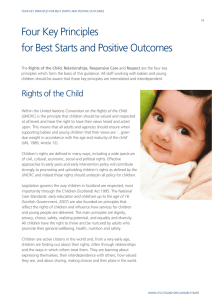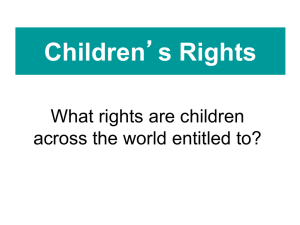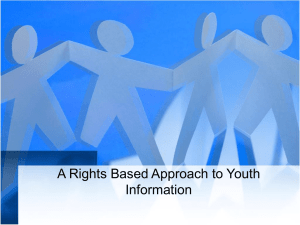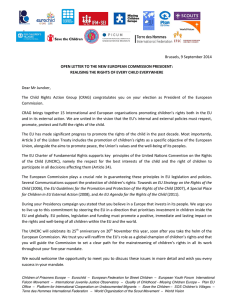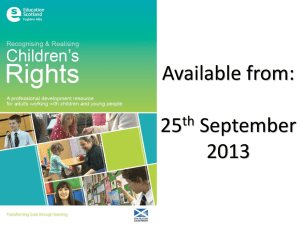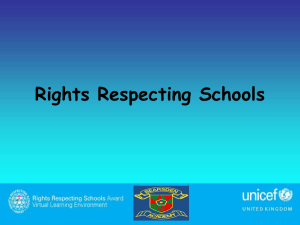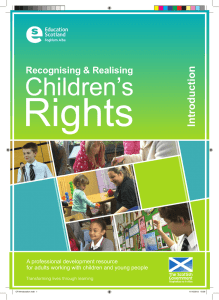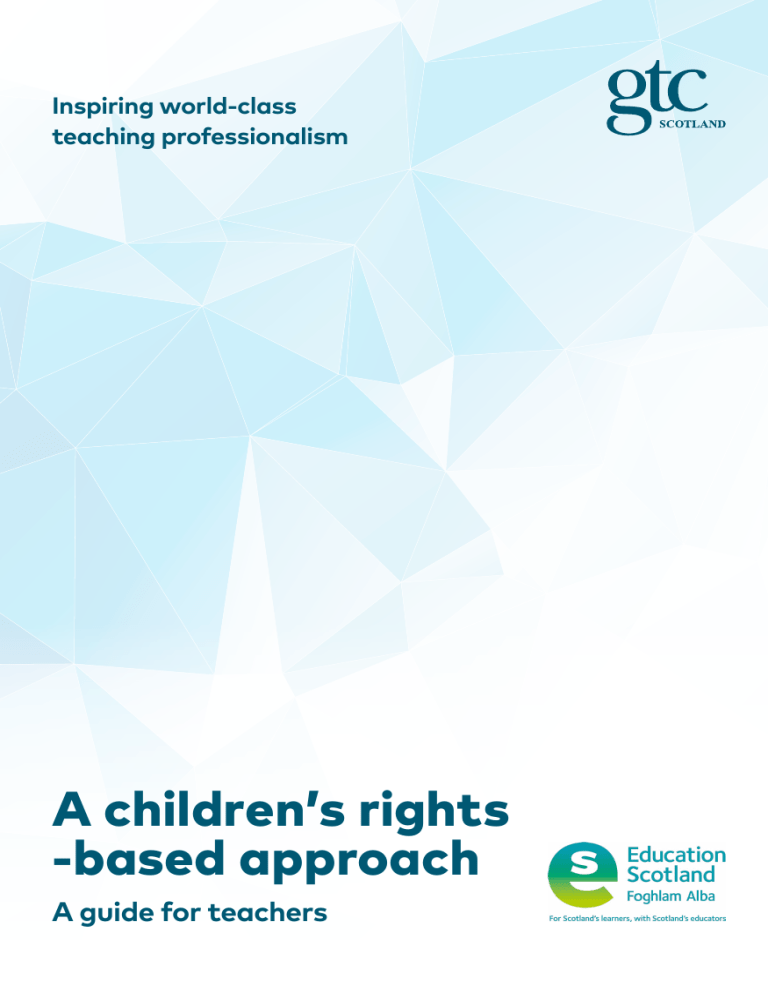
Inspiring world-class teaching professionalism A children’s rights -based approach A guide for teachers A CHILDREN’S RIGHTS-BASED APPROACH What is this guide for? The United Nations Convention on the Rights of the Child (UNCRC), is an International Treaty that seeks to protect the welfare and development of children. It applies to all children from birth to 18, and is universal, unconditional, indivisible, inherent and inalienable; children do not have to ‘earn’ rights through behaving in a particular way – rights should not be linked to responsibilities. Children also have human rights – as do adults – which are very similar, but children need extra protection because of their vulnerability. The UNCRC has 54 articles that cover all aspects of a child’s life and set out the civil, political, economic, social and cultural rights that all children are entitled to. It also explains how adults and governments must work together to make sure all children can enjoy all their rights with adults as duty bearers, and children as rights holders. Every child has rights, whatever their ethnicity, gender, religion, language, abilities or any other status. The four general principles of the UNCRC are: n Non-discrimination, meaning the UNCRC applies to all children: Article 2; n The best interests of the child: Article 3; n Every child has the right to life, survival and opportunities to develop to their 2 full potential: Article 6; and n Every child has a right to be heard and for their views to be taken into account in matters that affect them: Article 12. The articles of the UNCRC ensure that children are protected, have the opportunity to participate and are provided for – these are known as the ‘3 Ps’ (Participation, Protection and Provision). The purpose of this guide is to provide support for teachers to reflect on their actions and consider whether they may need further advice or professional learning. This guide is intended to complement your employer’s policies and is to help you embed a children’s rights-based approach and effective learner participation into your practice. It is part of a series of guides produced by GTC Scotland. The guides do not form part of the Professional Code for teachers. Teachers and schools may find them useful professional learning and discussion tools but they are not intended for use in any competency or conduct process. They are part of GTC Scotland’s services to teachers to enhance teacher professionalism as part of our advisory role as the professional body for all of Scotland’s teachers. GENERAL TEACHING COUNCIL FOR SCOTLAND What is expected of teachers The UK Government ratified the UNCRC in 1991, and in June 2019, the Scottish Government announced its intention to fully incorporate the UNCRC into Scot’s law, which will place a legal duty on all public bodies to promote and uphold children’s rights. ‘Getting it Right for Every child’ (GIRFEC) is underpinned by the UNCRC, and child protection and safeguarding policies and practice are upheld by children’s rights. Teachers will have a key role to play in this. A rights-based approach to education promotes improved relationships, ethos and attainment and achievement. Together’s 2017 report, The State of Children’s Rights in Scotland, identified a rights-based approach as being “a principled and practical framework for working with children and young people, grounded in the UNCRC and other international rights conventions. It is about placing the UNCRC at the heart of planning and service delivery and integrating children and young people’s rights into every aspect of decision making, policy and practice”. # Education Scotland 3 A CHILDREN’S RIGHTS-BASED APPROACH ow to develop and embed H a rights-based approach Rights-based approaches mean that the articles of the convention underpin the ethos of an organisation, and that all policies and practice are developed through consideration of the UNCRC. The impact of this includes: n Improved pupil-teacher relations; n Improved peer relations across the school age ranges; n Improved teaching and learning; n Improved guidance and support; n Creativity; n Emotional empathy; n A better school ethos and a greater sense of shared community; n A reciprocal sense of feeling valued, trusted and respected; n Life skills such as teamwork, problemsolving and citizenship; n Improved engagement, empowerment, and commitment to education; n Improved achievement and attainment; and n An addressing of the ‘attainment gap’ between learners from different backgrounds. Many teachers have already embraced rights-based approaches, and this needs to be further developed. All teachers need to become familiar with the UNCRC, and have child-friendly versions available for learners to access, discuss and refer to. Staff, parents and carers and the wider community should also be aware of the UNCRC, and work with the school to promote children’s rights. 4 Approaches to teaching, planning and policy development should all reflect and uphold the rights of children. Article 12 defines a child’s right to be listened to, and effective learner participation is an important aspect of a rights-based approach. Learner participation is all of the ways in which children and young people engage in dialogue with educational staff, parents, carers, and the community to create positive outcomes and changes. It is about ensuring that young people are recognised as participants alongside professionals and other members of the school community. Learner participation should be supported across a wide range of educational arenas including learning, teaching and assessment, opportunities for personal achievement, decision-making, and connections with the wider community. In an empowered school system children and young people are aware of their right to participate voluntarily in decision-making. They are able to express their views in a wide variety of ways and in a variety of settings. They have a say in shaping the educational and learning experiences in their setting and beyond and are a key part of the school improvement process. They have opportunities to participate in decisions in a wide variety of matters which affect them, leading to meaningful impacts and outcomes. They are also fully involved in monitoring and evaluating their participation and the impact of that participation. GENERAL TEACHING COUNCIL FOR SCOTLAND What you can do When developing and embedding a rights-based approach, ask yourself: n Am I aware of the UNCRC? n Do I model respectful behaviour at all times, and treat all learners and colleagues with dignity? n Do I link learners’ experiences explicitly to articles of the convention – for example, linking the right to clean water to lessons around the environment? n Can learners access information on the UNCRC? n Do I fully involve learners in establishing a relationships policy for the class or school, and link this to the UNCRC? n Are school or class systems to address disagreements, conflict and prejudicial attitudes and actions perceived as transparent, fair and effective by learners and adults. n Do I support learners to respect the rights of others, and to reflect on their own behaviour? n Do learners understand how local and global issues and sustainable development are linked to rights? n Do I provide opportunities for learners to learn ‘about’, ‘through’, and ‘for’ rights? n Do learners get the opportunity to lead their own learning and make choices in their learning? n What mechanisms are there for learners to contribute meaningfully to school improvement? n How do we recognise personal or wider achievement? 5 Additional resources n An Empowered System Guidance n Children and Young People’s Commissioner Scotland n Children’s Parliament: children’s human rights, participation and engagement n Decision-making: children and young people’s participation n Learner Participation in Educational Settings (3-18) n Meaningful Participation and Engagement of Children and Young People Children in Scotland’s Principles & Guidelines n Recognising and realising children’s rights: A professional learning resource to promote self-evaluation and improvement planning n The Compassionate and Connected Classroom: A health and wellbeing curricular resource for upper primary n UNCRC: the foundation of Getting it right for every child n Unicef Youth Advocacy Toolkit n United Nations Convention on the Rights of the Child – full text n United Nations Convention on the Rights of the Child - summary General Teaching Council for Scotland Clerwood House 96 Clermiston Road Edinburgh EH12 6UT T. 0131 314 6000 E. gtcs@gtcs.org.uk www.gtcs.org.uk 6
